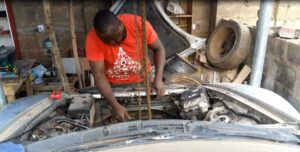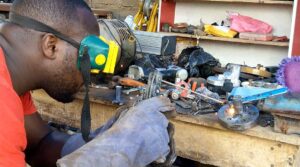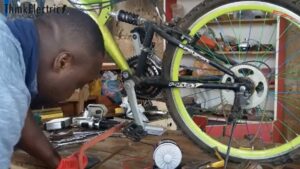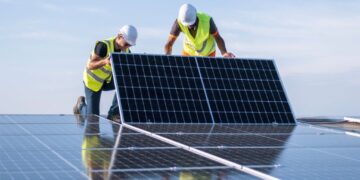It took a national protest in 2012 to charge Tolulope’s interest in Electric Vehicles.
With consumer prices already high, many Nigerians protested when the government abruptly announced an end to petrol subsidies, nearly doubling prices at the fuel pump.
“There was a protest in 2012 which caused fuel scarcity. I was trying to see other means of fueling my car when I discovered electric car. I contacted Nissan which produced the first commercially available electric vehicle.
The manager told me then that the car is available but the technology is not meant for nigeria due to lack of infrastructure and technician.
This took me to the drawing board to start researching on what we can have locally that will be suitable for Africa,” Tolulope said to me during our call.
Today, he is the director of ThinkElectric Africa Initiative, an organization with the sole mission of intensifying Africa’s transitioning to renewable energy and sustainable transport using indigenous technology, practical research, education and advocacy.

“So far, we have had patents and so many programmes including electric bike and vehicle projects. We have been able to speak at so many fora and convince a lot of people that this is what we need in Africa- sustainability and cheap maintainance.”
Leave it in the ground
He believes oil and gas should be left in the ground and lives for a day EVs will be affordable for Africans.
He says, “The oil and gas sector is a threat to our existence in the first place because of its carbon emission.
For the fact that most countries in Africa rely on fossil fuel, they believe it is not right for them to promote the adoption of electric vehicles. But the reality is that oil and gas will soon become a stranded asset.
We need to stop using it which begs the question, what can we use in the alternative?

EVs came as a means of mitigating climate change. When we talk of sustainable environment, the key sectors we should focus on are energy and transport. Once these two sectors have been decarbonised, the rest is easier, “he said.
A mismatch made in heaven
According to him, the lack of proper policy is the reason for the huge disparity between the academic and the industry.
“For a very long time, Academic and industry have been running in parallel lines. We do not develop most of the research we do. It always end up in papers.
Our people do not see how the technology of e-mobility can help our own economy. You see the amount of jobs the renewable energy sector can produce. Policy makers have not been able to adjust to that reality.
For most of us, we are sensitizing people because when the people can identify the advantageand push for it, then the policy makers will ahve no choice but to ruler in favor of the people. We are lobbying so that we can have policies that support innovation because whatever technology is being used for e-mobility, Africans can make their own . Examples abound in Ghana, Nigeria, Uganda among others.
We just need the right policies. Government needs to enecourage EVs by earmarking special funds for research and development for innovators or by funding plants like Ajaokuta Steel Mill to start working again in order to make the local production cheap.
This is an unstoppable movement,”he continued.
Untapped Potential
Speaking further, he noted that Africa needs to harness the power of its innovative youths in order for development to take place.
“We have a lot of skills on this continent but everyone is scattered around. By the time we aggregate this knowledge with the resources we have, development will take place. We are limited by funding.

I have met fantastic individuals that if I had the funds, I would bring all these people under one umbrella to do wonderful work for Africa. We will build silicon valley here. We will build a bigger Tesla here.
Government needs to encourage EVs by earmarking special funds for research and development for innovators or by funding plants like Ajaokuta Steel Mill to start working again in order to make the local production cheap,” he added.
Innovations
“When you talk to people about Evs, the next question they ask is, ‘Where’s the power?’
In order to encourage this, you need to provide alternative source of power which you find easily in Solar panels. We have worked on electric bicycles and showcased it. We have patents on how you can make capacity of the battery lasts longer.
What are our problems? What are the barriers to this technology?
Battery technology is one of the constraints for e-mobility around the world although Tesla is doing fine.
On our own, we have recycled more than 10,000 cells of which are those commonly found in laptops and power banks.
We are looking for more funding opportunities, grants, equity investment and whatever it is that can push us further on this mission
With this, we’ll be able to link rural access to the urban centers. There are a lot of farm produce that perish. Vehicles can not even ply these roads but when we have bikes, they will be able to go to those places and bring the produce to the market. Farmers will earn more and extra jobs will be created.
With the success it has already recorded in Nigeria, ThinkElectric Africa is well on its way to achieving these goals.























